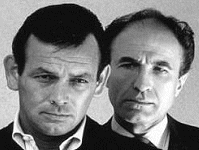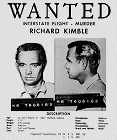Sixties
City presents
a wide-ranging series of
articles on all aspects of the Sixties, penned by the creator of the iconic
60s music paper Mersey
Beat
|
Sixties
City presents
a wide-ranging series of
articles on all aspects of the Sixties, penned by the creator of the iconic
60s music paper Mersey
Beat
|
||||||
|
| Television’s
longest-running manhunt was the popular series ‘The Fugitive’, which ran
for four years from 1963, lasting 120 episodes. The story was originally
inspired by ‘Les Miserables’, the classic Victor Hugo novel of a peasant
who is pursued relentlessly by an implacable policeman. The series starred David Janssen as Dr Richard Kimble, who arrives home one night to see a one-armed man fleeing from his house. He discovers the dead body of his wife Helen and, with no-one believing his story of the one-armed man, is arrested, convicted and sentenced to death. On the way to the penitentiary, his train is derailed and he escapes. He sets off to find the one-armed man and is, in turn, pursued by a determined police lieutenant Philip Gerard, played by Barry Morse. ‘The Fugitive’ attracted such attention that slogans began to appear on walls: ‘Kimble is innocent’, and a debate as to his guilt or innocence was a regular feature in the media. Critic Barry Norman, for instance, wrote: “I think Kimble is guilty. I think he’s a dirty, wife-slaying rat who deserves to be strung up from the nearest lamp-post.’ Right up until the climactic two-part ending, not even the members of the regular cast really knew how things would turn out. |
 |
  |
|
Article
|